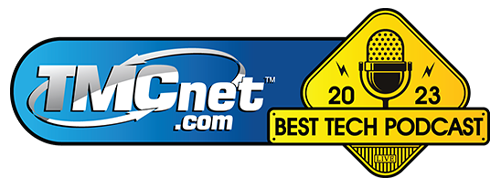EP 50: Move Your Business Telephones to Microsoft Teams
Posted on March 27, 2024 by Fusion Connect
In this episode of Tech UNMUTED, George and Santi discuss the often-overlooked feature of making external phone calls through Microsoft Teams, highlighting its potential to replace traditional office phone systems. They shed light on the necessary licenses and setup for activating this feature, emphasizing its benefits, especially in providing redundancy during network outages. The conversation also ventures into the future of collaboration tools, with a focus on the integration of AI through Microsoft's Copilot, predicting its evolution towards offering autonomous responses and sentiment analysis. This episode not only demystifies the capabilities of Microsoft Teams but also offers a glimpse into the future of workplace communication and efficiency, driven by AI advancements.
Watch & Listen
Tech UNMUTED is on YouTube
Catch up with new episodes or hear from our archive. Explore and subscribe!
Transcript for this Episode:
INTRODUCTION VOICEOVER: Dive into the world of innovation with us as we unravel the challenges, breakthroughs, and latest trends that are shaping our digital landscape. This is Tech UNMUTED, your guide to the tech revolution.
GEORGE: Welcome to the latest episode of Tech UNMUTED. Today, we're going to take a look at Microsoft Teams, specifically, how do you make a phone call in Microsoft Teams? What are some of the future things that are coming from a collaboration standpoint and how do we see AI getting even further integrated into the Teams platform?
SANTI: Yes, that's a good point because a lot of folks don't realize that you can actually make phone calls. They think of Teams, they're like, oh, yes, sure, I call people on Teams all the time. No, that's not what we're talking about. What you're doing is you're chatting or you're making a video or audio call inside of Teams. What George and I are talking about is that you can actually make a phone call to somebody outside of your organization. A lot of folks don't realize you can do that, so I thought it'd be good to just share my screen real quick and show you real briefly how you can actually pull this off.
If you have the phone system activated, you'll see a little icon that says calls, and here's your dial pad. I can literally dial out a number. I can also receive calls. If you have my phone number, my office number, you can actually call me, and I can actually receive calls. In essence, you could have Teams replace your legacy phone system back at the office. That's really what we're talking about here.
GEORGE: If you think about the AT&T outage that took place a couple of weeks ago, this is a redundant way to have, if you have a fixed cell phone number, you've got redundancy in the number here, or you could have this service with another set of redundancy behind it for the same number.
SANTI: Correct. That is correct. Then you have some basic settings like you can manage how you forward your calls. Do they go to voicemail, do they go somewhere else? You can also create managed call groups and delegates, so people can actually make and receive calls on your behalf. It's really cool. Honestly, it's like a full-blown PBX or phone system. So long as you have it enabled, you can go ahead and make and receive calls inside of Microsoft Teams. A lot of folks don't really understand that, so I thought it'd be good to show that.
Now, you do need to have at least-- so the way it works, if you have an E5, the ability to make and receive calls is already available to you. If you have an E3 and below, as far as licensing goes, you have to pay for what's called a phone standard license. Once you do that and you connect to an operator, like Fusion Connect would be an operator of Microsoft Teams, then all of a sudden, you have phone service. It's great.
Another thing is we all know about Copilot. Copilot is doing an amazing job so far inside of Microsoft 365, but let's be real, George. We have to ask Copilot what we want. You and I talked about things that we see, trends that we see for 2024, and I still think that autonomous responses from artificial intelligence is in the very, very near future where I don't have to tell Copilot, hey, I need a summary of this, or can you go ahead and schedule this meeting? It is anticipating and automatically creating these outcomes. I don't know what your thoughts are, but I see that in the very, very near future.
GEORGE: I wrote an article about this on LinkedIn probably a month, a month and a half ago. I think this is a huge opportunity going forward to automate individual tasks, right?
SANTI: Yes.
GEORGE: Not having to ask it to record a meeting with Teams Premium, as an example, and then be able to analyze the data after it. Having it sit right next to you as an assistant, dynamically taking notes and coming back to you and saying, here's the notes in its most basic sense, or potentially at the end of the day, saying, I know you had a call at ten o'clock with Santi, and you agreed to send them some files. I can see in your email that you didn't send those files. I've gathered them for you in an email. Can you check that they're the right ones and send them? That's the place where we're going. Pieces of that exist today, right?
SANTI: Yes.
GEORGE: I think we'll see that emerge probably before the end of the year in that basic use case.
SANTI: Yes. Today Copilot can summarize your meetings for you, right? It can do a summary of transcriptions. It can do, with Teams Premium, it can do stuff like tag and give you chapters. You can go back and play back things. You can even probably ask Copilot to look at a very lengthy chat and just say, hey, just get me caught up, and it'll do that for you. Yes, I believe that-- It'll even give you like suggested tasks based on transcription. That's something that's available today, but it's not just suggestive tasks, it is, hey, these are my suggested tasks. Do you want me to go ahead and generate that task for you?
GEORGE: Yes.
SANTI: Or, I heard that you're going to do a follow-up with this person. I have three dates available. Which one do you want me to schedule? That's the type of autonomous response I think we're going to see real soon. Listen, it's not that far away. It's already doing a lot of it, it's just a lot of it has to be prompted right now. I see that.
As far as meeting insights, I love the transcription services inside of Teams. If you have Teams Premium, you get that transcription summarized into a logical summary where it actually tells you, hey, by the way, this conversation happened and this is what was said. Here are some suggestive tasks. That's all part of Premium. You don't even need Copilot for that, right? That's just Premium. Then the fact that you can take Copilot and have it dig even deeper into the call, that is the plus.
What about this? Ready for this, George? I did this playing around the other day. Just me fooling around. I grabbed a transcript, and I pasted it into Copilot. I said, hey, can you analyze this transcript and tell me what the sentiment of the call was? It created an output. It actually went person by person and told me, hey, this is pretty neutral. This sounded pretty positive. This sounds humorous. It just went through and analyzed the whole thing. That tells me that Copilot already has the ability to do sentiment analysis. I would not be surprised if we will see that, again, automatically in future radiations of Copilot.
Yes, think about it. Copilot's already listening to your call. It's already recording. It's analyzing transcripts for summary, so why wouldn't it include some type of sentiment analysis, which today, if you want that, you have to pay for some expensive contact centers of service or some other type of service. Imagine if it just does this by default. I know it can do it because it did it for me when I pasted it, so it's just a matter of Microsoft rolling that in. I think that's coming too. I could see that happening.
GEORGE: We'll talk a little bit more about that on a future episode, maybe the next episode.
SANTI: Sure.
GEORGE: About some of the use cases in different industries and even the ability to, in real-time, provide that feedback. You could be on a Teams call with somebody from another country. There could be some language or some social nuance that you're not aware of that AI could pick up on and start to prompt you and say, hey, you've created an uncomfortable situation or you're creating friction and you may not realize it. That could extend all the way through call center agents.
SANTI: Yes, that'd be amazing, actually.
GEORGE: Yes, I will point out, and we've said this on previous episodes, we do record the podcast on Teams Premium. There are a lot of meeting functionalities built in Teams Premium, but there's also a webinar functionality that works quite well that we use for this recording. Do you want to move on to the last piece of this?
SANTI: Yes, let's just wrap it up. Obviously, with anything, when we talk about artificial intelligence, with anything AI-related, there's always that security and compliance concerns. Listen, already, I can tell you, Teams is great because it does encrypt your data. If you have Premium, you can encrypt even more. It encrypts stuff. Not only does it encrypt the stuff that's in flight between the Teams clients, but even stuff that's not in motion, so it's good to know. It's important to know that.
It also has some compliance standards. Teams has some compliance standards. This does not make you compliant. This is what people don't understand. It helps you to meet those compliancy standards. Stuff like HIPAA and ISO 27001 and whatever. It does have these things built in. One thing to keep in mind is that with Teams, you can also dictate certain security criterias. You can actually set retention policies for your meetings and your files and dictate how your data is managed and kept safe.
Listen, we said it before, Microsoft Teams, it's evolving, it never stops evolving. We're constantly seeing awesome things come out of Teams. This is going to be the hub for all future ways of doing work. If you're not in Teams today, we highly suggest you look into it. If you're in an old legacy phone system, look at making Teams your new phone system and look at Copilot to make your workers a lot more effective and really generate answers and summarize stuff that would take you hours, Copilot can do in minutes. Anyway, I'm off my soapbox. I just wanted to-- I'm excited about Teams.
GEORGE: We've talked about it a lot before, right? There's this shift to the platform, especially in smaller companies. You eliminate the need to do a lot of integration because out of the box, you get the integration from the platform from 365. To your point on security and compliance, you can layer those security protocols and those classifications on data ubiquitously across everything in the environment, where if you've integrated individual pieces together, you're going to have to look at them one by one and make sure that you've set stuff up in a compliant way. The shift to Copilot really requires that. You need to look at how you have documents, security, and classification set up as an example to be fully confident in standing up Copilot internally.
SANTI: Anyway, folks, we just wanted to do a quick podcast today to show you all the great things that Teams is doing today and what we predict is going to be the future of Teams with artificial intelligence. We really don't think it's going to be that far away, just based on what we're seeing. Folks, until next time, stay tuned. We’ve got more coming your way.
CLOSING VOICEOVER: Thanks for diving into the tech world with us today. Don't forget to subscribe and hit the bell icon to never miss an episode of Tech UNMUTED. Stay curious, stay connected.
Episode Credits:
Produced by: Fusion Connect
Listen on Your Favorite Podcast Player:


Expert insights, exclusive content, and the latest updates on Microsoft products and services - direct to your inbox. Subscribe to Tech ROUNDUP!
Tech UNMUTED, the podcast of modern collaboration, where we tell the stories of how collaboration tools enable businesses to be more efficient and connected. Humans have collaborated since the beginning of time – we’re wired to work together to solve complex problems, brainstorm novel solutions and build a connected community. On Tech UNMUTED, we’ll cover the latest industry trends and dive into real-world examples of how technology is inspiring businesses and communities to be more efficient and connected. Tune in to learn how today's table-stakes technologies are fostering a collaborative culture, serving as the anchor for exceptional customer service.
Tech UNMUTED is a production of Fusion Connect, LLC.

 Amazon Music
Amazon Music Podcast Index
Podcast Index TuneIn
TuneIn Listen Notes
Listen Notes